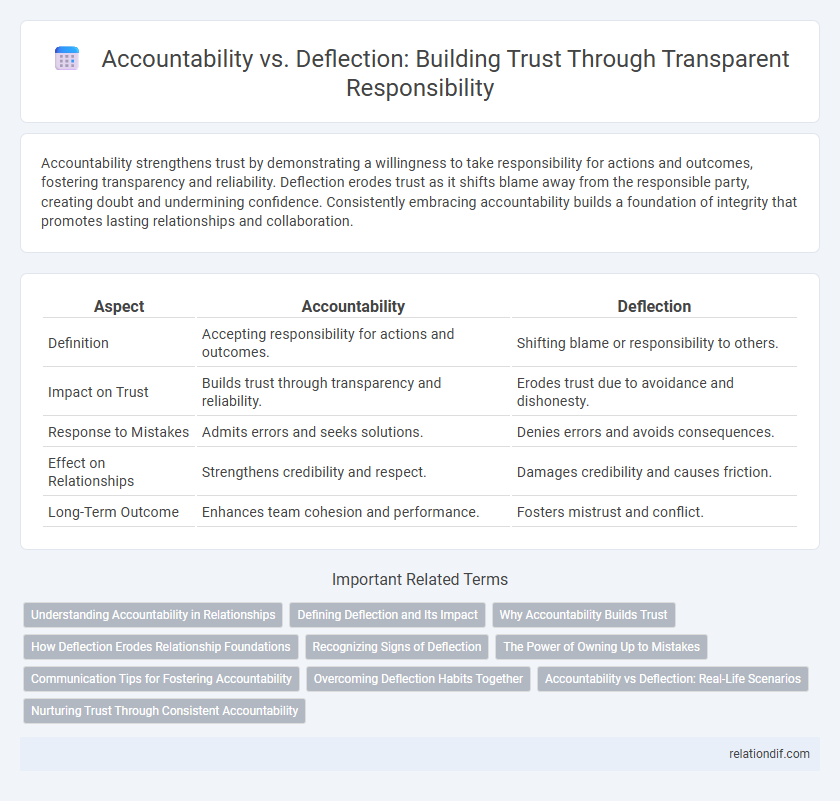Accountability strengthens trust by demonstrating a willingness to take responsibility for actions and outcomes, fostering transparency and reliability. Deflection erodes trust as it shifts blame away from the responsible party, creating doubt and undermining confidence. Consistently embracing accountability builds a foundation of integrity that promotes lasting relationships and collaboration.
Table of Comparison
| Aspect | Accountability | Deflection |
|---|---|---|
| Definition | Accepting responsibility for actions and outcomes. | Shifting blame or responsibility to others. |
| Impact on Trust | Builds trust through transparency and reliability. | Erodes trust due to avoidance and dishonesty. |
| Response to Mistakes | Admits errors and seeks solutions. | Denies errors and avoids consequences. |
| Effect on Relationships | Strengthens credibility and respect. | Damages credibility and causes friction. |
| Long-Term Outcome | Enhances team cohesion and performance. | Fosters mistrust and conflict. |
Understanding Accountability in Relationships
Understanding accountability in relationships fosters trust by encouraging individuals to accept responsibility for their actions and their impact on others. This transparency promotes open communication and strengthens emotional bonds, reducing conflicts and misunderstandings. Deflection, by contrast, undermines trust by avoiding responsibility and creating barriers to genuine connection and resolution.
Defining Deflection and Its Impact
Deflection involves shifting blame or responsibility away from oneself to avoid accountability, often undermining trust in personal and professional relationships. This behavior erodes credibility and transparency, leading to confusion and decreased team cohesion. Recognizing and addressing deflection is crucial for fostering a culture of accountability and building lasting trust.
Why Accountability Builds Trust
Accountability builds trust by demonstrating reliability and transparency, showing that individuals or organizations take responsibility for their actions and outcomes. This fosters a culture of honesty, where stakeholders feel confident that issues will be addressed rather than ignored or shifted. Transparent accountability reduces uncertainty and reinforces credibility, making it a cornerstone of lasting trust in any relationship or business environment.
How Deflection Erodes Relationship Foundations
Deflection undermines accountability by shifting blame and avoiding responsibility, which erodes trust and damages communication within relationships. This behavior fosters confusion and resentment, weakening the emotional connection and creating barriers to resolution. Over time, continuous deflection destabilizes relationship foundations, making genuine collaboration and mutual respect difficult to maintain.
Recognizing Signs of Deflection
Recognizing signs of deflection involves identifying behaviors such as shifting blame, avoiding direct answers, or changing the subject when confronted with responsibility. Accountability requires owning decisions and actions, while deflection undermines trust by obscuring the truth and preventing resolution. Effective trust-building demands awareness of these signs to address and redirect conversations toward transparency and responsibility.
The Power of Owning Up to Mistakes
Owning up to mistakes strengthens trust by demonstrating accountability and integrity, fostering a culture of transparency. Accepting responsibility encourages growth and learning, while deflection undermines credibility and damages relationships. Embracing accountability empowers individuals and organizations to resolve issues more effectively and build lasting trust.
Communication Tips for Fostering Accountability
Clear, transparent communication cultivates accountability by encouraging individuals to own their actions and decisions. Using specific, constructive feedback reduces the temptation to deflect blame and promotes a culture of responsibility. Establishing regular check-ins and open dialogue channels reinforces trust and ensures alignment on goals and expectations.
Overcoming Deflection Habits Together
Overcoming deflection habits together strengthens accountability by fostering open communication and mutual responsibility within teams. Encouraging honest self-reflection and creating a supportive environment reduces blame-shifting behaviors and builds trust. Consistent feedback mechanisms and shared goal-setting promote transparency, ensuring collective commitment to accountability.
Accountability vs Deflection: Real-Life Scenarios
Accountability in real-life scenarios fosters trust by encouraging individuals and organizations to own their actions and outcomes, leading to transparent problem-solving and improved relationships. In contrast, deflection undermines trust as it involves shifting blame or avoiding responsibility, which creates confusion and resentment among stakeholders. Consistent accountability demonstrates integrity and builds a foundation for long-term collaboration and success.
Nurturing Trust Through Consistent Accountability
Consistent accountability nurtures trust by demonstrating reliability and transparency in actions and decisions. Embracing responsibility rather than deflecting blame fosters a culture where honesty and integrity thrive, reinforcing stakeholder confidence. Building trust through accountability enhances collaboration and strengthens relationships across organizations and communities.
Accountability vs Deflection Infographic

 relationdif.com
relationdif.com